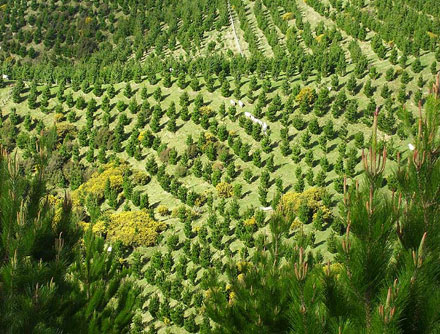
The South Canterbury forestry industry is ripe for investment, while plantation owners who are keen to expand face various challenges, an industry expert says. Source: Stuff NZ
Competing against dairying and pastoral crops for viable land, as well as overseas investment requirements, are just some of the factors cited as making investment challenging for both domestic and international markets.
Laurie Forestry managing director Allan Laurie said the industry was heading into a peak for the next eight to 10 years and, if younger, he would be planting trees right now.
“There is a huge opportunity to capture good prices.
“If I was young I’d be out planting trees. New Zealand has this unique opportunity to grow and be master of your own destiny.
“I’d be out there planting forests like mad,” he said.
Laurie Forestry, a forest management and harvesting company, worked with plantations in the region in district council and private ownership, amounting to around 2500 hectares, Laurie said.
The improvement in the market was due to the stable economy in China, a key export market for New Zealand, making prices stable.
In previous years the market had been unpredictable and prices were “volatile”, which made investment risky, he said.
“We have ability to sell volume to China and Canada. We have a stable government and can consistently supply them.”
According to the Forest Owners Association (FOA), more than $5 billion worth of wood fibre was exported in 2016, with $2.2b of that going to China.
Preliminary results from the FOA and Ministry for Primary Industries’
“Facts and Figures” report for the year ending 2016 showed 409,997 cubic metres of wood fibre was exported through Timaru’s PrimePort.
That was well up from the 2015 total of 259,495 cubic metres.
He said most countries with big forestry industries were in a period of reducing their volume, whereas New Zealand had been increasing its volume for the past two years.
Port Blakely, a major player in South Canterbury forestry is searching for land to expand operations but several hurdles are making the process difficult.
The company currently had about 9000 hectares of land across the Geraldine and Waimate forests, as well as Saddle Peak and Pentland Hills.
Managing director Phil Taylor said it would love to expand operations in South Canterbury and was “actively searching for existing forests and suitable land”.
“We are very keen to expand resources in South Canterbury.”
Proof of its commitment was the recent purchase of 83.11 hectares of land on Kowhatu Road in Waimate for forestry, he said.
Mr Taylor said the industry was in good shape.
“At the moment there is strong demand in local and export markets. Forestry is an interesting investment. You have to have a long-term view.”
Despite the company’s interest in increasing operations, inflated land prices and overseas investment requirements were “big challenges” Mr Taylor said.
“Expanding is more problematic for us. This is based around our ability to get suitable lands, in existing forests.
“There’s a couple of problems. One is that if you look at land use in NZ, generally the price of land is too expensive to support good economic return.
“From dairy to agriculture, our land is overpriced. This comes from farming capital gain.” For overseas investors, investment requirements made it challenging to purchase land because of the cost of the process.
“It’s getting more and more challenging. “We have the capital and we can make the numbers work,” Mr Taylor said.
He said there was demand for renewable resources and a strong correlation between increased population and demand for timber.







